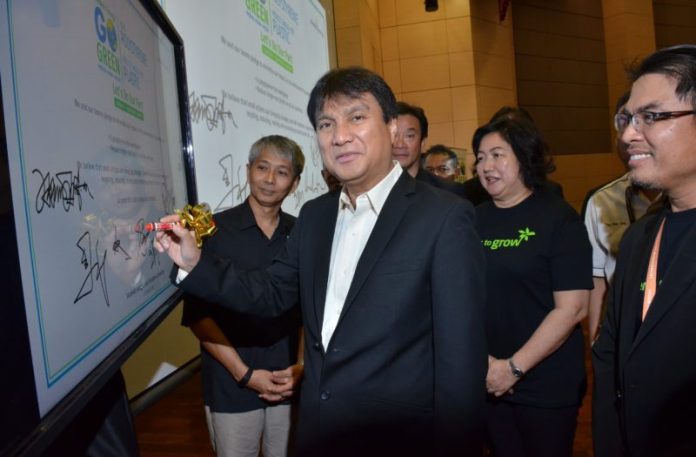
KUCHING, April 27: Sarawak Energy Berhad (SEB) launched a campaign to reduce plastic usage at its offices and power plants today, pledging to phase out single use plastics and polystyrene as part of a three-year ‘Go Green’ campaign with targets to conserve, regenerate and sustain the environment.
SEB Group chief executive officer Sharbini Suhaili led the Group Executive Committee (GEC) in embarking on the campaign, launching ‘Zero Polystyrene, Reduce Single-Use Plastic’ in line with Earth Day 2018 as the first phase of the campaign.
“SEB aspires to be a leading organisation in sustainability and environmental stewardship. As a state-owned energy development company, we are entrusted with developing our resources to meet the needs of the present without compromising the ability of future generations to meet their own needs,” he said during the launching of the campaign at SEB headquarters here this morning.
Sharbini said Sarawak’s move into renewable and affordable hydropower as the predominant part of its generation mix has enabled state’s grid carbon intensity to be reduced by 72 per cent since 2010.
Working under the direction of the state government, the company incorporates other renewables like solar and mini-hydro into its rural electrification programmes and is working towards researching production, storage and usage of hydrogen fuel cells to provide green energy for the state’s public transportation sector, he added.
Sharbini revealed that SEB also partnered with like-minded agencies on community projects with an environmental focus such as wetlands mangrove replanting.
“We were amongst the first local corporate organisations in Sarawak to initiate and embed sustainability and environmental initiatives into our projects and operations as part of our overall corporate commitment to mitigate any negative impact and maximise the positive.
“Companies like ours can and must lead – we have a 5,000 strong workforce who can work together to minimise our individual impact on the environment. With this initiative, we are making sure each of us can play a role,” he said.
Sharbini said polystyrene containers and plastic bags for food takeaways have been banned on all SEB premises since April 1 this year, after estimating that almost 40,000 polystyrene containers would end up in landfills per year.
“Let’s do our part in ending plastic pollution. Every plastic bag you have ever used is buried in a landfill somewhere so please be aware of this. Use plastic bags again and again or better yet, use reusable grocery bags or one of our great Murum baskets to help reduce bag waste.
“Reduce, reuse or recycle — bring your own containers for takeaway, say no to plastic cutlery, and try to bring reusable drinking water bottles. It may not seem like much but we cannot sit back and do nothing,” he added.
The campaign launch was also supported by Wildlife Conservation Society (WCS) Malaysia and featured an environmental talk by WCS Malaysia director Dr Melvin Gumal. Other activities included exhibitions, a recyclable and e-waste take back program and a colouring contest for staff children.
Commenting on SEB’s initiative to do its part Dr Melvin said: “We live in a time when large corporations have a massive carbon and ecological footprint, not just in their operations but in the collateral impact of their huge numbers of staff. Over 80 per cent of millennials now expect companies to have identified environmental values and to live up to them.
“In other words, actions speak louder than words. And those actions have to resonate not just within the company, but also out into the wider community through their staff where the benefits can be transformative. It is for this reason that we are engaged with corporations like SEB wanting to do environmental change from within and with top management who practices what it preaches and leads by example,” he concluded. — DayakDaily








